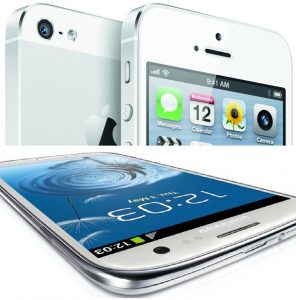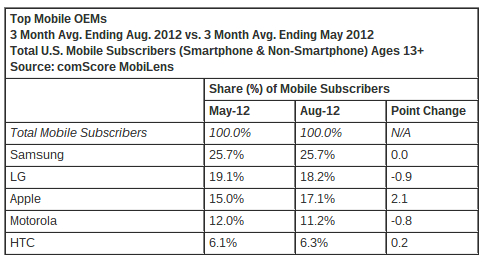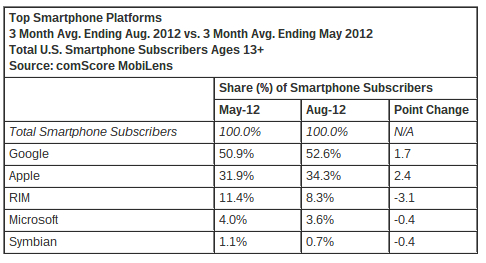US smartphone market consolidates around Android, iPhone
 In a move appropriate for another two-party presidential election season, there is now little room for three dominant smartphone operating systems. The US market is now decisively consolidated around just two, Apple and Google platforms, as rivals -- including BlackBerry and Windows Phone -- make brisk retreats.
In a move appropriate for another two-party presidential election season, there is now little room for three dominant smartphone operating systems. The US market is now decisively consolidated around just two, Apple and Google platforms, as rivals -- including BlackBerry and Windows Phone -- make brisk retreats.
For the three months ended in August, Android and iOS had combined 86.9 percent smartphone subscriber share -- that's up from 82.8 percent at the end of May, according to comScore. August 2011: 71 percent. As combined share approaches 90 percent, a third-party contender looks less likely. Both potential candidates lost share during the three months, all gobbled up by the leaders.
Android share increased to 52.6 percent from 50.9 percent, while Apple grew to 34.3 percent from 31.9 percent. Year earlier: 43.7 percent and 27.3 percent, respectively. Meanwhile, during the three months, BlackBerry share fell to 8.3 percent from 11.4 percent and Microsoft platforms Windows Mobile and Phone to 3.6 percent from 4 percent. August 2011: 19.7 percent and 5.7 percent, respectively. Combined, year over year, Microsoft and Research in Motion mobile operating systems lost 13.5 points, while Apple and Google platforms gained 15.9 points.
The point: The two dominant platforms also took share from others, mainly Symbian, giving up nothing for the others. The trend forebodes trouble as Microsoft and RIM launch new operating systems -- Windows Phone 8 and BlackBerry 10, respectively.
Among manufacturers of all devices (smart and not), Samsung share remains stuck, largely unchanged -- down slightly -- for most of 2011. In August: 25.7 percent, up from 25.3 percent a year earlier. Apple, by comparison, made tremendous gains, with US subscriber share rising from 9.8 percent to 17.1 percent August to August. At this pace, Apple tracks to take the No. 2 spot from LG this year.
While Apple and Samsung are posed to become the overall phone leaders, there is plenty of room for a third or even fourth major competitor. LG and Motorola retreats are significant but not blood loss like Microsoft and RIM smartphone platforms. Fourth-ranked Motorola's share fell to 11.2 percent from 14 percent year over year, while LG retreated to 18.2 percent from 21 percent. However, their losses all went to Apple, which subscriber share grew 75 percent year over year.


To compile the data, comScore surveys 30,000 US cellular subscribers 13 or older. Two-hundred-thirty-four million Americans have cellular handsets; 116.5 million have smartphones, just shy of 50 percent.